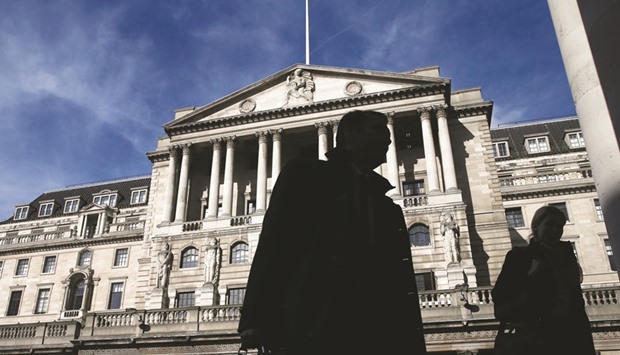The Bank of England may cut interest rates for the first time since 2009 next week to stabilise an economy in turmoil after Britons voted to leave the European Union, according to a majority of economists.
Governor Mark Carney has said stimulus is likely to be needed soon and many economists expect the Monetary Policy Committee to act before new forecasts are produced next month. Twenty-nine of 53 surveyed by Bloomberg predict the benchmark will be lowered on July 14, with the majority seeing a 25 basis-point cut to 0.25%.
Carney has warned of a “material slowdown” and signs of deterioration have already started to emerge, with retailers reporting their worst June in a decade and a gauge of consumer confidence plunging the most in 21 years. Post-referendum stresses are also showing in markets. The pound sank to a 31-year low this week and several property funds have been forced to freeze withdrawals to stop investors dumping their holdings.
“The economy has turned down sharply and the argument for a rate cut is clear,” said Rob Wood, chief UK economist at Bank of America Merrill Lynch in London and a former BoE official. “It’s not rocket science that the economy has had a big negative shock — that’s there for the world to see — and that means the BoE will cut rates.”
Wood, who predicts the MPC will lower the rate 40 basis points to 0.1%, is among a group of six economists who predict larger cuts, ranging from 40 to 50 basis points. Twenty-four of the respondents said the rate will be left unchanged at the current record-low 0.5%. The decision, minutes of the gathering and a breakdown of the voting pattern will be published at noon in London on Thursday.
With Carney emerging as a pillar of authority amid the political vacuum created by the Brexit vote, Thursday’s BoE commentary will be closely scrutinised. The central bank has already increased its liquidity operations and relaxed bank rules to encourage lending. Even those economists forecasting officials will stand pat on rates in July say a cut is in the offing soon.
Goldman Sachs Group and Deutsche Bank predict policy makers will act on August 4, when they publish new forecasts in their quarterly Inflation Report and the governor holds a press conference. Data published between the July and August meetings will also help flesh out the economic outlook and Carney said last month the gatherings should be considered as “as a bit of a package.”
“At the moment they’ve got very, very little to go on,” said George Buckley, an economist at Deutsche Bank in London. “It would be better to wait until the August meeting, which is only three weeks later. They could use the July meeting to tee the market up for a move in August.”
Taking the rate lower isn’t without complications. A move too low could be counterproductive by weakening bank margins and damping credit supply. While the BoE once thought 0.5% was the lower bound, officials have since signalled they can go closer to zero, though Carney said they’ll keep a close eye on the impact on lenders.
The central bank could also choose to boost its quantitative-easing program, currently at £375bn ($485bn), or even start a new policy that would see it buy corporate credit. While 39 of 42 economists in a separate survey expect officials to maintain the asset-purchase target next week, many see scope for an increase in the future and Goldman Sachs predicts the BoE will also start buying corporate bonds later in the year.
“If the decision to leave the EU is as large a macro shock as we estimate, then the BoE will look to additional policy options,” said Andrew Benito, an economist at Goldman Sachs and a former BoE official. “We expect the MPC to leave rates on hold on July 14 and instead expect a rate cut to be deferred just three weeks to August. There the BoE will be able to give greater detail motivating and justifying its rate cut and other policy easing.”

Pedestrians walk past the Bank of England in London. Twenty-nine of 53 surveyed by Bloomberg predict the interest rate will be lowered on July 14, with the majority seeing a 25 basis-point cut to 0.25%.
